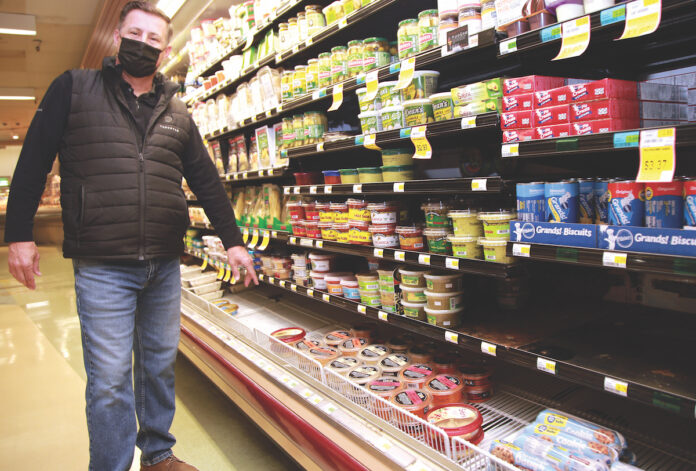Ron Clements, Jr. first came to understand the significance of the current supply chain issues at the onset of the coronavirus pandemic. The owner of Scotts Valley Market had heard people were fighting for toilet paper at Costco, so he figured he better get some for his own store pronto.
“I ordered one truck originally, and then they sent me two more—so obviously, I just took them,” he said, adding soon people were driving from as far away as San Jose and Prunedale for the product. “I think we were one of the last folks to have toilet paper.”
Eventually, the lockdown panic buying began to recede, and markets were able to fill shelves with warehoused products from around the country. But this was just the beginning of a journey that saw a series of snags in the fabric of capitalism, leading to delivery delays and higher prices.
According to a survey of more than 1,000 small to medium-sized businesses across North America, by October last year, 87% of respondents had spent more than usual on transportation and logistics to overcome shortages in the supply chain. Two months later, research from data company SCORE emerged, showing more than one-third of small business owners had jacked-up prices by at least 10%.
Other Scotts Valley businesses have also reported supply chain challenges in recent days.
Yuvi Boparai, the manager of Papa Murphy’s Take ‘N’ Bake Pizza, says, while their operations haven’t been hit too hard, it’s not uncommon to have to start using different ingredients at a moment’s notice. The brand of gloves they use changed, too, he notes.
And there are some salad dressing options they haven’t received in about a year, according to Boparai.
It’s not just that shipments arrive late, sometimes they’ll show up a day early, he added.
Zachary Hinds, the manager of Skip’s Tire and Auto Center, says they haven’t had too much trouble with logistics, either, since big companies like Michelin and BF Goodrich had large stockpiles. But he says it’s been harder to get tires for some specialized cars.
Vice Mayor Jim Reed says there isn’t much City of Scotts Valley officials can do to ease supply chain bottlenecks. However, he’s been looking into some possible solutions.
“Currently there are restrictions on where businesses can store containers in Scotts Valley,” he said, adding he’s spoken to some representatives from larger companies about the possibility of slashing this bit of red tape. “I’d love to see the City accommodate them through a temporary change. We’ve provided so much help to our businesses in other ways during the pandemic that it’s frustrating we can’t do more that’s meaningful on the supply-chain front.”
Back in the grocery world, Clements says the last couple of years has been a masterclass in all the little things that can bog down his business.
“We couldn’t get supplies because the manufacturers just couldn’t keep up,” he said. “Then they started running out of aluminum for cans.”
Suddenly, Clements was having trouble finding replacement parts.
“The manufacturers can’t get the little pieces to repair things,” he said, noting this came into play when outfitting their mobile kitchens with key items last April. “We ended up buying a few more (pieces of equipment) just because of the supply chain issues, to have on backup.”
Clements says he had to look all the way to Canada to find a specific axle for one of their vehicles, for example.
This all adds up—and results in the customer seeing a higher tally on their grocery receipt, he adds. He, too, reluctantly had to raise prices—although he notes he also raised wages to attract new workers.
His suppliers are having staffing problems, too, he said.
“Covid has really hit the warehouses,” he said. “People are calling in sick.”
But another threat to his businesses has continued to grow during the pandemic: Amazon. The online giant operates its own delivery network, meaning it has more control over distribution.
But Clements says small retailers like him can offer something that Amazon can’t—a personal touch for local residents.
“They sell a lot of product, and they’re very efficient in what they do,” he said. “We adjust to the consumer’s needs.”










